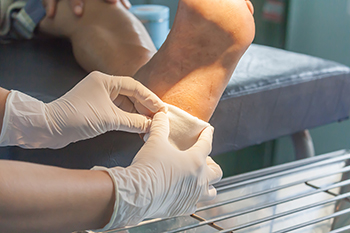
A chronic foot wound is a wound on the foot that does not repair itself in a normal or timely manner. Because such wounds can have serious consequences, it is important for those at risk to practice wound prevention and treatment guidelines. Wounds on the feet can include arterial, diabetic, pressure wounds and venous ulcers. When such wounds surface, it is crucial that they be assessed and even biopsied. Treating such wounds is based on the TIME principle which stands for tissue debridement, infection control, moisture balance, and edges of the wound. Once these things are evaluated, treatment is specific to the wound type. Underlying conditions, such as diabetes or vascular disease are also important to manage. If you are someone who has chronic foot wounds, it is highly suggested that you are under the care of a podiatrist, who can regularly examine your feet and immediately treat wounds that surface.
Wound care is an important part in dealing with diabetes. If you have diabetes and a foot wound or would like more information about wound care for diabetics, consult with Howard Kimmel, DPM from Buckeye Foot Care. Our doctor will assess your condition and provide you with quality foot and ankle treatment.
What Is Wound Care?
Wound care is the practice of taking proper care of a wound. This can range from the smallest to the largest of wounds. While everyone can benefit from proper wound care, it is much more important for diabetics. Diabetics often suffer from poor blood circulation which causes wounds to heal much slower than they would in a non-diabetic.
What Is the Importance of Wound Care?
While it may not seem apparent with small ulcers on the foot, for diabetics, any size ulcer can become infected. Diabetics often also suffer from neuropathy, or nerve loss. This means they might not even feel when they have an ulcer on their foot. If the wound becomes severely infected, amputation may be necessary. Therefore, it is of the upmost importance to properly care for any and all foot wounds.
How to Care for Wounds
The best way to care for foot wounds is to prevent them. For diabetics, this means daily inspections of the feet for any signs of abnormalities or ulcers. It is also recommended to see a podiatrist several times a year for a foot inspection. If you do have an ulcer, run the wound under water to clear dirt from the wound; then apply antibiotic ointment to the wound and cover with a bandage. Bandages should be changed daily and keeping pressure off the wound is smart. It is advised to see a podiatrist, who can keep an eye on it.
If you have any questions, please feel free to contact one of our offices located in Brook Park and Willoughby, OH . We offer the newest diagnostic and treatment technologies for all your foot care needs.
